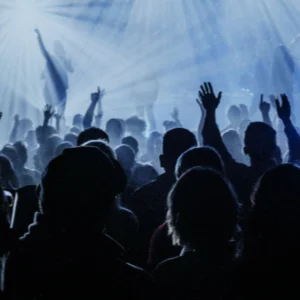Sleep took the stage, guitarist/Vocalist Matt Pike hit the first strum on his guitar and Oakland's Fox Theatre shook. Literally. The volume was so high, and the bass turned up to such a massive wattage, that the sold out audience could literally feel every single note played by Sleep's three members. As the band rumbled through its epic Dopesmoker album, the invisible physical contact created the bridge to what Sleep refers to as the divine awareness in Dopesmoker June 5.
Playing a few select dates to celebrate the release of its legendary, 60-minute epic, single-track sludge doom masterpiece, the band made it the focus of its two-hour, 15-minute show. Opening with Dopesmoker's iconic 10-minute intro of hanging bass and guitar, the band seemed to enter a different plane. Standing relatively still, the members trudged forward with the lumbering song, increasing the volume from the studio version, but also by making it even slower. Just as Pike's guitar was a massive lash of sound, bassist/vocalist Al Cisneros' bass reverberated through the floors and people. In fact, the sound connected through the physical so much, that at times it seemed that one's chest could feel Cisneros' fingers on the strings.
It's a testament to the legendary song that in the 25 minutes that opened the show with Dopesmoker the band became more and more enthralling despite the repetitive nature of the song. In part, interest was lassoed by the sheer crushing sound of slow lumbering riffs so that the music was as much a sonic experience as it was an experiment in sensory manipulation. By merely listening to Dopesmoker, one feels as massive and ancient as the tales that inspired its genesis. Further, because Dopesmoker is so titanic, minute changes that might go unnoticed in "regular" songs become fascinating, urging the listener to savor every tiny detail.
After playing the first third or so of Dopesmoker, the band broke into an hour-and-forty-five-minute selection from their its two albums, Volume One and Holy Mountain. Interesting, while those albums are fairly "rocking," based around Sabbath-style blues swinging, in response to Dopesmoker's monolithic experience, the band slowed down, and intensified its older songs too, almost so that the older material had been revamped and pulled to its most extreme form. Perhaps because Sleep was in its hometown (sort of), while most songs from its catalogue were played, none of the song were truncated, but rather, many were blown up into extended jam sessions. It was on the trippier explorations that newish drummer Jason Roeder shined, bashing forward with a primal pounding, but also a calculated, creeping, cadence.
After weaving its back catalogue together, the band returned to a 25-minute or so Dopesmoker reprise where the band finished the album. Again, the audience was (mostly) enthralled by the sheer power and volume of the song. Indeed, Dopesmoker live, with its simply colossal riffs, was so massive that it was literally impossible to do anything but devote unwavering attention, which most interestingly, is in stark contrast to the public reception of the studio version.
The show opened with doom metalers Kowloon Walled City. Influenced by Sleep (and Sabbath of course) the band crushed through about eight extended tunes devoted to the power of the riff and down tempo growling. They were warmly received by the audience. It seems that if the band wants to make a name for itself, all it needs to do now is maintain its adept skills and show how it is different from the pack.
And speaking of being different from the pack, Oxbow played directly before Sleep. Fronted by the manic Eugene Robinson, the band didn't so much play songs as frantic movements, then would start out as violent smashing, only to drop to gothic soundscapes, only to then snap back up to thread-shredding howling. Oxbow is frequently called "avant garde metal" and while that tag might be too convenient, it works. The band's songs were almost performance pieces, with Robinson snapping his body around howling out a refrain before dropping into a spacey, almost Jim Morrison-style monologue. Most interesting is Robinson's range of voice. Although he began the show with a manic (almost hair metal) shriek, he quickly shifted to a barritone shout. But, throughout the show, he would sing in a bluesy howl or even a lover's rock cooing at times.
But, while Eugene is a visible frontman, the band itself is quite impressive, shifting from punk smashing to almost classical arrangements to beatnik-style cacophony. Fittingly, halfway through the set, Robinson acknowledged how far both Sleep and his own band had gone, commenting on Sleep's original run, "When we last played with Sleep, in San Jose, there were seven of you there. Where are you?" And of course he acknowledged Sleep's dedication to "spiritual enlightenment" as well as most of their fans' similar quest, by stating, near the end of Oxbow's set, "I wasn't high when I came out hereâ¦"
Random notes:
-There is a mad delicious hot dog stand across from the Fox Theatre near the uptown. Fantastic hot links and for once, the merchant is a really polite guy.
-With two massive statues abutting the stage, each of which had glowing eyes, the Fox Theatre is probably the absolutely best place in the world for this band to play this one album.
-I don't think Eugene Robinson can keep his clothes on for longer than a 45-minute stretch. Halfway through Oxbow's set, he was already down to his skivvies.
-Honestly, there only seemed to be nominally more tokers at the Sleep show than most concerts, which did surprise me. I particularly remember Jimmy Page and the Black Crows having at least three times as many "Weedians."
-Before any rumors sprout up, no, I did not toke myself. I am far too timid for any of that type of stuff.
-So you thought you could out heavy metal me, Joe Pelone? You thought you could out heavy metal me? This. Is. What. You. Get.
